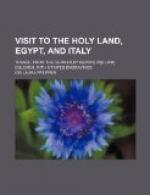From Bir to Jabrud, where we rested for a few hours, we travelled for six hours through a monotonous and sterile country. We had still a good four hours’ ride before us to Nablus, our resting-place for the night.
The roads here are bad beyond conception, so that at first the stranger despairs of passing them either on foot or on horseback. Frequently the way leads up hill and down dale, over great masses of rock; and I was truly surprised at the strength and agility of our poor horses, which displayed extraordinary sagacity in picking out the little ledges on which they could place their feet safely in climbing from rock to rock. Sometimes we crossed smooth slabs of stone, where the horses were in imminent danger of slipping; at others, the road led us past frightful chasms, the sight of which was sufficient to make me dizzy. I had read many accounts of these roads, and was prepared to find them bad enough; but my expectations were far surpassed by the reality. All that the traveller can do is to trust in Providence, and abandon himself to fate and to the sagacity of his horse.
An hour and a half before we reached the goal of this day’s journey, we passed the grave of the patriarch Jacob. Had our attention not been particularly drawn to this monument, we should have ridden by without noticing it, for a few scattered blocks of stone are all that remain. A little farther on we enter the Samaritan territory, and here is “Jacob’s well,” where our Saviour held converse with the woman of Samaria. The masonry of the well has altogether vanished, but the spring still gushes forth from a rock.
Nablus, the ancient Sichem, the chief town of Samaria, contains four thousand inhabitants, and is reputed to be one of the most ancient towns in Palestine. It is surrounded by a strong wall, and consists of a long and very dirty street. We rode through the town from one end to the other, and past the poor-looking bazaar, where nothing struck me but the sight of some fresh figs, which were at this early season already exposed for sale. Of course we bought the fruit at once; but it had a very bad flavour.
A number of soldiers are seen in all the towns. They are Arnauts, a wild, savage race of men, who appear to be regarded with more dread by the inhabitants than the wandering tribes whose incursions they are intended to repress.
We pitched our tents on a little hill immediately outside the town. Few things are more disagreeable to the traveller than being compelled to bivouac near a town or village in the East. All the inhabitants, both young and old, flock round in order to examine the European caravan, which is a most unusual sight for them, as closely as possible. They frequently even crowd into the tents, and it becomes necessary to expel the intruders almost by main force. Not only are strangers excessively annoyed at being thus made a gazing-stock, but they also run a risk of being plundered.




